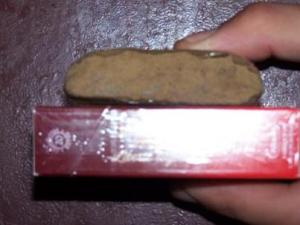
Lebanon is one of the world's leading has producers, and the Bekaa Valley has long been known as a site of cannabis production. During the Lebanese civil war, the trade blossomed into a multi-billion dollar business, but after the war, the government banned it in 1992, and has undertaken eradication operations with varying degrees of enthusiasm each year since.
Hash producers also fought back Monday morning by using burning tires to block roads in some neighborhoods in Baalbek and in the town of Boudai. Police managed to clear those blockages by midday Monday. And armed men also attacked tractors used to destroy the crop. The National News Agency reported that 15 tractors were attacked in Ain al-Sawda, with the drivers reporting that they were warned not to take part in the eradication effort.
The hash farmers accused the Lebanese government of depriving them of their main source of income and neglecting the area's development needs. They argued that the Valley has been poor and marginalized for decades, and repeated crop substitution efforts have been half-hearted at best.
But Colonel Adel Mashmoushi, head of the Lebanese anti-drug agency, defended the eradication effort. He called cannabis "a dangerous poison" and warned "drugs will spread in Lebanese society," if the crop is not destroyed.
"Everybody knows that if we do not destroy cannabis, this will tarnish Lebanon's reputation on the international level," he added. "These plants deprive the Bekaa of all legitimate sources of making a living. God willing, in the coming days will prove how serious the state is in this move, we will continue to destroy cannabis until the last plant is eradicated."
And so begins the harvest season in Lebanon.
Lebanon Hash Farmers Attack Eradicators
Consequences of Prohibition
Drug War Issues
Politics & Advocacy
hashish (wikimedia.org)
Permission to Reprint: This content is licensed under a modified Creative Commons Attribution license. Content of a purely educational nature in Drug War Chronicle appear courtesy of DRCNet Foundation, unless otherwise noted.
Comments
"Everybody knows that if we
"Everybody knows that if we do not destroy cannabis, this will tarnish Lebanon's reputation on the international level," he added. "These plants deprive the Bekaa of all legitimate sources of making a living. God willing, in the coming days will prove how serious the state is in this move, we will continue to destroy cannabis until the last plant is eradicated."
I am fairly certain that Hezbollah has done more to tarnish Lebanon's international image then hash. Moron.
In reply to "Everybody knows that if we by Dumb Colonel (not verified)
At least the Hezbollah is the
At least the Hezbollah is the majority of the country, because over 80% of the Lebanese people are Shiite, and over 80% of them are members of Hezbollah. I bet if Hezbollah was in power, which it can't be because the Lebanese Constitution which was written by the Reagan Administration, prevents them from being either the President or the Prime Minister of the country even though they make up the vast majority of Lebanese, the Hashish would be totally legal.
Westerners are just ignorant of most everything, that's why we are so disliked around the world.
In reply to At least the Hezbollah is the by BP Storm (not verified)
Hezbollah
I'm afraid Hezbollah membership is not 80% in Lebanon, for if it were they would
control more seats in the government and the leadership, as well. Islamic culture does not approve of cannabis
use as it is prohibited in the Quran. If Hezbollah controlled the government it would be eradicated for sure.
Lebanese Hashish
The ruling regime in Lebanon, no matter who, makes these noises from time to time. Meanwhile the centuries-old tradition of hashish production will continue. My main complaint is with the apparent fact that Lebanese hashish no longer makes it to the U.S. black market, as far as I can tell. Eradication efforts on the part of Rabat will reduce the supply even further.
Also the "hash" produced by legal US Cannabis dispensaries appears to be, in the main, "bubble hash," a product inferior in taste and head to the Lebanese product. US dispensaries should produce true hashish in the Lebanese method: successive beatings of dried mature plants, the resulting powder grades collected and pressed into cakes. Yum!
we will continue to destroy
we will continue to destroy cannabis until the last plant is eradicated ....obviously a agenda driven individual as since eradication has not happened the the Valley for 1000 years, it has no hope of doing so now. (I'm simply amazed how demonization, rhetoric and political statements can cross any border to repeat themselves in any language... guess people really are the same, world over.)
Demonization of Marijuana...Hash...
I am looking for a job right now and am amazed that employers in Washington State can legally get away with random drug, alcohol, and no cigarettes. No felonies or drug related misdemeanors...Where do employers find employees that worship at the Church Of Sobriety? If this is the Land Of the Free And The Home Of the Brave Drug laws are glaring proof that we are neither free nor brave when it comes to getting the government hacks out of our personal lives...its interesting that the growers in Lebanons Bekka Valley actually protect their livelihood at the barrel of a gun against a government presence!
Add new comment